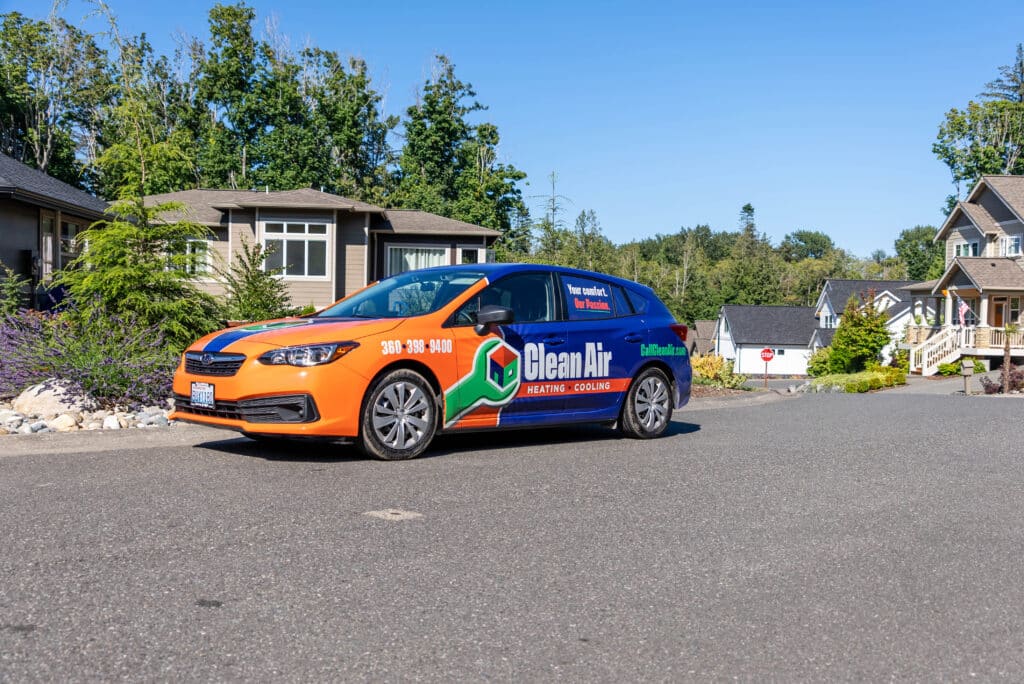Finding the Everett WA Air Quality: Breathe Easy!
If you’re searching for information on Everett WA air quality, you’re in the right place. Today, the air quality in Everett is considered good, with an overall Air Quality Index (AQI) of 12, driven mainly by PM2.5 pollutants. Here is a quick overview:
- Air Quality Index (AQI): 12 (Good)
- Primary Pollutant: PM2.5 (2.1 µg/m³)
- Health Impact: Minimal risk, suitable for outdoor activities
Air quality directly affects our health and well-being. In Everett, WA, the air quality is currently safe for most people. However, even good air quality requires understanding and monitoring, especially with changing weather and environmental conditions.
My name is Colin Matei, Owner and President of Clean Air Heating & Cooling. With a background rooted in enhancing air quality in Everett, WA, I am committed to ensuring you have the most accurate and helpful information.
Stay tuned for more on how Everett’s air quality impacts your health and what you can do to ensure you’re breathing clean, fresh air. The next sections will dive deeper into the Air Quality Index and recent data trends.

Everett WA air quality terms explained:
– Everett Heating
– Everett HVAC
– Heating and Cooling Everett
Understanding Air Quality Index (AQI)
What is AQI?
The Air Quality Index (AQI) is a tool used to communicate how polluted the air currently is or how polluted it is forecast to become. Think of it as a yardstick that runs from 0 to 500, where the lower the number, the cleaner the air.
The AQI focuses on health effects you may experience within a few hours or days after breathing polluted air. Here’s a quick breakdown of the AQI scale:
- 0-50: Good
- 51-100: Moderate
- 101-150: Unhealthy for Sensitive Groups
- 151-200: Unhealthy
- 201-300: Very Unhealthy
- 301-500: Hazardous
How is AQI Calculated?
The AQI is calculated based on the concentration of several pollutants in the air. These pollutants include:
- PM2.5: Fine particulate matter smaller than 2.5 micrometers.
- PM10: Particulate matter smaller than 10 micrometers.
- NO2: Nitrogen dioxide.
- O3: Ground-level ozone.
- CO: Carbon monoxide.
- SO2: Sulfur dioxide.
Each pollutant has a specific formula that converts its concentration in the air to a number on the AQI scale. The highest of these numbers becomes the overall AQI for that area.
Monitoring Stations
Air quality is monitored using various stations scattered throughout the city. In Everett, there are several key monitoring stations, including:
- Center Road, South Everett
- Silver Lake
- Bayside
- Rucker Hill
These stations collect real-time data on pollutant levels, which are then used to calculate the AQI. For example, on a recent day, the AQI readings from these stations were:
| Station | US AQI |
|---|---|
| Center Road | 29 |
| Silver Lake | 13 |
| Bayside | 11 |
| Rucker Hill | 7 |

Health Implications
Understanding the AQI is crucial because it helps you take action to protect your health. For instance:
- Good (0-50): Air quality is satisfactory, and air pollution poses little or no risk.
- Moderate (51-100): Air quality is acceptable; however, some pollutants may be a concern for a very small number of people who are unusually sensitive to air pollution.
- Unhealthy for Sensitive Groups (101-150): Members of sensitive groups may experience health effects. The general public is less likely to be affected.
- Unhealthy (151-200): Everyone may begin to experience health effects; members of sensitive groups may experience more serious health effects.
- Very Unhealthy (201-300): Health alert; everyone may experience more serious health effects.
- Hazardous (301-500): Health warnings of emergency conditions. The entire population is more likely to be affected.
By monitoring the AQI, you can make informed decisions, such as whether to spend time outdoors or take steps to improve indoor air quality.

Stay tuned for the next sections, where we will explore the current air quality in Everett and the factors affecting it.
Current Air Quality in Everett, WA
Primary Pollutants in Everett
Everett, WA enjoys generally good air quality, but understand the primary pollutants that can affect it. The main pollutants monitored in Everett include:
- PM2.5 (Particulate Matter less than 2.5 micrometers): These fine particles can enter the lungs and bloodstream, causing serious health issues. Currently, the PM2.5 level in Everett is 8.26 µg/m³, which is considered good.
- PM10 (Particulate Matter less than 10 micrometers): While larger than PM2.5, these particles can still cause respiratory issues. The PM10 level in Everett is 31.1 µg/m³, also in the good range.
- CO (Carbon Monoxide): This colorless, odorless gas can be harmful when inhaled in large amounts. Everett’s CO level is 210 µg/m³, which is well within the safe range.
- NO2 (Nitrogen Dioxide): High levels of NO2 can lead to respiratory problems. The NO2 level in Everett is 24.58 µg/m³, which is considered good.
- O3 (Ozone): Ground-level ozone can aggravate respiratory diseases. The current O3 level in Everett is 31.1 µg/m³, also in the good range.
- SO2 (Sulfur Dioxide): This gas can cause respiratory problems and other health issues. The SO2 level in Everett is 8.36 µg/m³, which is considered good.
Recent Trends and Data
Everett’s air quality has generally been good, but it can vary due to several factors like wildfires and urban emissions.
Seasonal Variations
Air quality in Everett can fluctuate with the seasons. For instance, wildfires during the summer can significantly increase PM2.5 levels. Recent data shows that Everett’s air quality index (AQI) can range from as low as 7 at the Rucker Hill station to as high as 29 at Center Road, South Everett. These values are still within the “Good” category, but stay informed, especially during wildfire season.
Historical Data
Historically, Everett has maintained relatively low levels of major pollutants. However, temporary spikes can occur due to external factors like nearby wildfires. For example, during severe wildfire events, cities like Seattle have seen AQI levels rise to 186, which is unhealthy. While Everett hasn’t experienced such extreme levels recently, it’s crucial to be prepared.
By keeping an eye on the AQI and understanding the primary pollutants, residents of Everett can take steps to protect their health and enjoy the cleaner air the city usually offers.
Factors Affecting Air Quality in Everett
Impact of Wildfires
Wildfires are a significant factor impacting Everett WA air quality, especially during the summer and early fall. Smoke from wildfires can travel long distances, bringing with it high levels of PM2.5 (fine particulate matter) and other pollutants. For instance, nearby wildfires along the West Coast can send smoke and ash into the air, raising the AQI to unhealthy levels.
Case in point: During severe wildfire events, cities like Seattle have seen AQI levels rise to 186, which is unhealthy. While Everett hasn’t experienced such extreme levels recently, it’s crucial to be prepared.
Wildfires not only increase PM2.5 but also lift levels of CO (Carbon Monoxide) and NO2 (Nitrogen Dioxide), affecting respiratory health. Sensitive groups, such as children, the elderly, and those with existing health conditions, should take extra precautions during wildfire season.
Urban and Industrial Emissions
Urban and industrial activities are another significant source of air pollution in Everett. Traffic emissions, factories, and construction activities release various pollutants into the air, including NO2, PM10, and SO2.
Traffic Emissions
Traffic emissions are a major contributor to air pollution in urban areas. Vehicles emit NO2, CO, and PM10, which can lead to respiratory issues and other health problems. With increasing traffic, especially during peak hours, these pollutants can accumulate and degrade air quality.
Industrial Activities
Factories and industrial plants in and around Everett also contribute to air pollution. These facilities often release SO2, NO2, and PM10 into the atmosphere. Construction activities can further exacerbate the problem by generating dust and other particulate matter.
Example: During the construction of new buildings or roads, levels of PM10 can rise, leading to temporary spikes in air pollution. While these levels usually return to normal once construction is completed, monitor air quality during such periods.
By understanding the impact of wildfires and urban emissions, residents of Everett can better prepare and take steps to protect their health. Monitoring the AQI and staying informed about local air quality conditions are crucial actions for everyone in the community.
Health Implications of Poor Air Quality
Short-term Health Effects
Poor air quality can have immediate effects on your health. Respiratory issues are common, especially for sensitive groups like children, the elderly, and those with pre-existing conditions. Asthma sufferers might experience aggravated symptoms, and even those without asthma can find themselves coughing or having difficulty breathing.
Irritation of the eyes, nose, and throat is another short-term effect. This can make daily activities uncomfortable and stressful. Allergies can also be triggered or worsened by pollutants like PM2.5 and PM10, causing sneezing, runny nose, and itchy eyes.
Example: During periods of high pollution, such as wildfire events, you might notice more people wearing masks to avoid inhaling harmful particles. According to the research, Seattle’s air quality during wildfires can be as bad as smoking seven cigarettes a day.
Long-term Health Effects
Long-term exposure to poor air quality can lead to serious health problems. Chronic diseases such as lung cancer and heart conditions become more likely with prolonged exposure to pollutants like NO2 and PM2.5. These tiny particles can enter the lungs and bloodstream, causing lasting damage.
Cardiovascular diseases are particularly concerning. Pollutants can cause inflammation and stress on the heart, leading to conditions like heart attacks and strokes. Lung cancer is another severe risk, as harmful particles can mutate cells in the respiratory system over time.
Vulnerable populations are at higher risk for these long-term effects. Children, the elderly, and those with existing health issues need to be especially cautious. For instance, long-term exposure to high levels of NO2 can lead to the development of chronic respiratory diseases in children.
Quote: “Breathing in high levels of Nitrogen Dioxide increases the risk of respiratory problems,” according to air quality data.
By understanding these health implications, you can take steps to protect yourself and your loved ones from the dangers of poor air quality.
How to Protect Yourself from Poor Air Quality
Indoor Air Quality Solutions
Improving indoor air quality is essential, especially when outdoor air quality is poor. Here are some effective solutions:
Air Purifiers: These devices can remove pollutants like PM2.5 and PM10 from your indoor air. Air scrubbers are a more heavy-duty option, often used during home renovations to clean the air from dust, debris, and other harmful pollutants.
HVAC Systems: Make sure your HVAC system is well-maintained. Regularly changing air filters can significantly improve air quality. Clean Air Heating & Cooling offers comprehensive services to keep your HVAC system in top shape. A clean HVAC system will filter out pollutants and circulate clean air throughout your home.
Dehumidifiers: High humidity can lead to mold growth, which can worsen indoor air quality. Using a dehumidifier helps maintain a humidity level between 30% and 50%, reducing the risk of mold and improving air quality.
Indoor Activities: On days when the Everett WA air quality is poor, limit outdoor activities and stay indoors as much as possible. This reduces your exposure to harmful pollutants.
Outdoor Activity Recommendations
When the air quality is poor, taking precautions during outdoor activities is crucial:
Avoidance: On days with high pollution levels, try to stay indoors as much as possible. If you must go outside, limit strenuous activities that can make you breathe harder.
Masks: Wearing a mask can help filter out harmful particles. Look for masks that are rated to protect against PM2.5 and other pollutants. During wildfire events, masks are particularly useful to avoid inhaling smoke and ash.
Monitoring AQI: Keep an eye on the Air Quality Index (AQI) for Everett. Websites and apps provide real-time data and forecasts. If the AQI is high, plan your day accordingly to minimize exposure.
By taking these steps, you can protect yourself and your family from the harmful effects of poor air quality. Simple actions like using air purifiers, maintaining your HVAC system, and monitoring the AQI can make a big difference in your health and well-being.
Frequently Asked Questions about Everett WA Air Quality
What city in Washington has the best air quality?
Bellingham often tops the list for the cleanest air in Washington. According to the American Lung Association, Bellingham consistently maintains low levels of air pollution, making it an ideal place for those seeking fresh, clean air. Its coastal location and lower population density contribute to its excellent air quality.
Is Washington State air quality good?
Overall, Washington State enjoys relatively good air quality. However, there are regional differences. Coastal cities like Bellingham and Everett benefit from ocean breezes that help disperse pollutants. In contrast, eastern areas, especially during wildfire season, can experience higher pollution levels. The state’s proactive environmental regulations and natural landscapes contribute to generally low pollution levels.
What is the air quality forecast for Plain WA?
Plain, WA often enjoys ideal conditions for outdoor activities, thanks to its lower pollution levels. The area typically boasts good air quality, making it perfect for hiking, biking, and other outdoor trips. To stay updated, use forecast tools like weather apps and websites that provide real-time Air Quality Index (AQI) data. This helps you plan your activities and avoid days with poor air quality.
By understanding the air quality in different parts of Washington, you can make informed decisions about where to live and how to protect your health.
Conclusion
Everett WA air quality is generally good, but it can fluctuate due to various factors like wildfires and urban emissions. Understanding the air quality index (AQI) and staying informed about current conditions can help you make better decisions for your health.
Health Precautions
Even when air quality is good, take precautions, especially if you belong to sensitive groups. Here are some tips:
- Monitor AQI regularly: Keep an eye on local air quality reports to stay updated.
- Stay indoors: On days when air quality is poor, limit outdoor activities.
- Use air purifiers: Invest in air purifiers to maintain good indoor air quality.
- Wear masks: If you must go outside during high pollution days, consider wearing a particulate mask.
Clean Air Heating & Cooling
At Clean Air Heating & Cooling, we are committed to helping you maintain a healthy indoor environment. Our services include:
- HVAC installation and repair: Ensure your heating and cooling systems are working efficiently.
- Air quality solutions: We offer the latest air purifiers and filters to keep your indoor air clean.
- Emergency services: Available 24/7 to address any urgent HVAC needs.
Customer Satisfaction
We pride ourselves on delivering exceptional service and building long-lasting relationships with our customers. With a 5-star rating on Google, our clients trust us to provide reliable and high-quality HVAC solutions.
For more information on how we can help improve your indoor air quality, visit our heating and cooling services page.
By staying informed and taking proactive measures, you can ensure that you and your family breathe clean, healthy air both indoors and outdoors.





